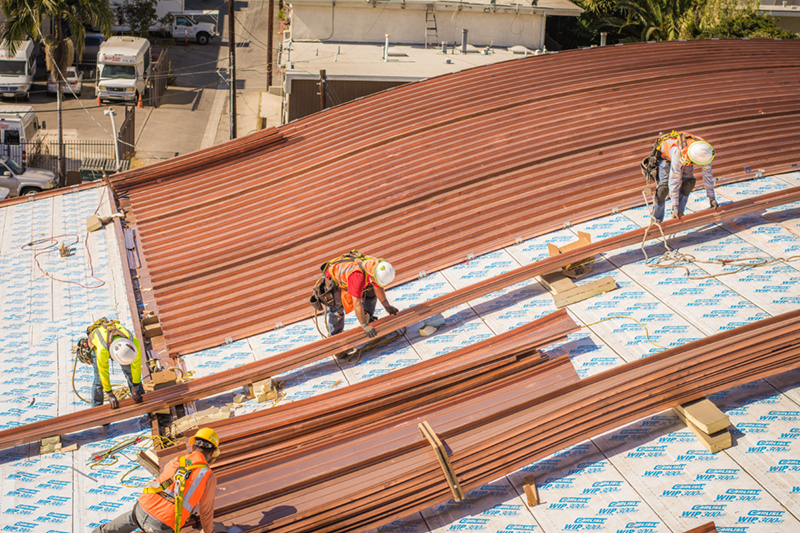Understanding a Commercial Roofing Warranty

When making decisions about a new roof for your commercial building, one of the many factors to consider is what type of roofing warranty you’re receiving. Unfortunately, figuring out these warranties can be every bit as complicated as deciding which materials to use or which manufacturer to buy from. Is it a lifetime warranty, and if not, what is the warranty term? What is the warranty coverage? What is NOT covered? Does the warranty cover materials, workmanship, or both? How are warranty claims filed?
At RoofSource, when guiding our customers through the process of identifying the best building materials, spec writing, etc., we also make sure they understand the process of getting the best possible roofing warranty. The following brief overview should provide a basic understanding so you can make informed decisions on the type of warranty you need for your building and whether you’re getting the best coverage for your roofing system.
Understanding the Basics
Before we delve into the different types of warranties available and what they cover, let’s cover a couple of important general rules that apply to virtually all roofing warranties so you can go into your roofing project with your eyes open.
The Warranty Reflects the Quality
A warranty offers assurance of quality control for your roofing project giving you peace of mind that your roof will perform as expected over the duration of the warranted period and most likely beyond. Neither roofing manufacturers nor roofing contractors want you to have to use the warranty because it costs them extra money when you do. Thus, in almost all cases, the warranty assures that the best products and the best workmanship are applied to your project.
Look at What Is Covered, Not Just Warranty Length
Since warranties are based on risk, there’s a lot of “wiggle room” available in the coverage, which often translates to cost for the consumer. Many owners look at the length of the warranty to decide if it’s good coverage, but in the fine print, you may find roofing problems that aren’t covered, or only offer partial coverage for an additional cost. You’re not necessarily getting good coverage with a lifetime warranty if you’re setting up to get nickeled-and-dimed to the point of frustration every time you need to file a claim. Less expensive warranties that provide limited coverage are rarely worth the additional cost. When evaluating a warranty, don’t just base your judgment on coverage length; make sure you also understand what is and isn’t covered.
Common Exclusions
Just to manage your expectations – no matter how ironclad your coverage may be, roofing warranties rarely (if ever) cover the following situations:
- Leaks due to damage: Leaks caused by anything other than defective materials (e.g., falling objects) generally won’t be covered.
- Negligence: Warranties void if you don’t maintain the roof according to prescribed guidelines or if you allow excessive foot traffic on the roof.
- Damage caused by unauthorized modifications: If you modify the roof or make changes that fall outside the scope of manufacturers’ specifications, any damage won’t be covered.
- Improper repairs: Understandably, manufacturers and contractors can’t warrant repairs completed outside of their technical specifications.
Common Types of Commercial Roof Warranties
There are two commercial roof warranties:
- The warranty provided by the manufacturer, which may cover roofing materials only, or a combination of materials and labor
- The warranty provided by the roofing contractor/installer, which is typically a workmanship warranty
Quite often, you’ll be dealing with warranties from both parties, sometimes with a bit of overlap. Let’s take a look at four of the most common types of commercial roofing warranties you’ll find available.
1. Manufacturer’s NDL Warranty
Arguably the strongest commercial manufacturer’s warranty you can get, the NDL (no dollar limit) warranty covers the entire roof system against material defects or failures. It provides a guarantee repair or roof replacement regardless of the cost. Depending on the type of roof, an NDL warranty can last up to 30 years. The cost for the warranty is calculated by the square foot. For a roof to qualify for this warranty, the system must be installed exactly to manufacturer specifications and confirmed by an inspection.
2. Manufacturer’s Labor and Material Warranty
This warranty is similar in scope to the NDL warranty. It covers both labor and materials, but it carries maximum dollar limits, which are also prorated over time. The older your roof is, the less the manufacturer is required to pay on the cost of repairs or replacement, and the more you will pay out of pocket.
3. Manufacturer’s Material-Only Warranty
This warranty effectively offers the least amount of coverage, but it’s also the most popular because it is offered for free or at a minimal cost. This is exclusively a product warranty that guarantees the roofing product’s viability for a certain amount of time. It covers no labor costs, nor does it cover the costs of other materials like flashing or materials that the contractor provides during installation. When choosing a material warranty, you’d also be advised to make sure the contractor also offers a warranty on installation.
4. Contractor’s Workmanship Warranty
In addition to warranties offered by the manufacturer, the contractor almost always provides their own warranty covering workmanship and installation errors, including products they provide in addition to the manufacturer’s coverage. These warranties can last between 1-5 years, and you should hold suspect any contractor or installer who does not back their work with at least some type of warranty.
Getting the Coverage You Need
Securing a strong roofing warranty is an essential piece of any commercial roofing project. RoofSource works with customers to find the best products and materials for their particular needs, and we also guide our customers through the process of bids, spec writing, and warranty options. Contact RoofSource today to learn more about how we can help.
